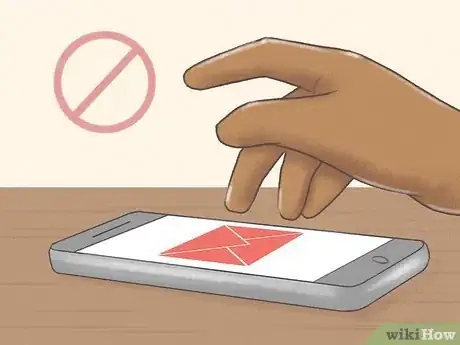This article was co-authored by Kelli Miller, LCSW, MSW and by wikiHow staff writer, Megaera Lorenz, PhD. Kelli Miller is a Psychotherapist based in Los Angeles, California. Kelli specializes in individual and couples therapy focusing on relationships, depression, anxiety, sexuality, communication, parenting, and more. Kelli also facilitates groups for those struggling with alcohol and drug addiction as well as anger management groups. She is the author of “Professor Kelli’s Guide to Finding a Husband” and the award-winning and best-selling book “Thriving with ADHD”. Kelli co-hosted an advice show on LA Talk Radio and is a relationship expert for The Examiner. She received her MSW (Masters of Social Work) from the University of Pennsylvania and a BA in Sociology/Health from the University of Florida.
There are 11 references cited in this article, which can be found at the bottom of the page.
This article has been viewed 94,885 times.
It’s normal to feel a little jealousy from time to time. But when it gets out of control, jealousy has the potential to break down trust and ruin relationships. If you just can’t move past your own feelings of jealousy, or if your partner’s jealousy is causing problems between you, it’s time to take action. The good news is that you and your partner can overcome jealousy if you’re willing to work together.
Steps
Expert Q&A
Did you know you can get premium answers for this article?
Unlock premium answers by supporting wikiHow
-
QuestionWhat should I avoid in a relationship?
 Kelli Miller, LCSW, MSWKelli Miller is a Psychotherapist based in Los Angeles, California. Kelli specializes in individual and couples therapy focusing on relationships, depression, anxiety, sexuality, communication, parenting, and more. Kelli also facilitates groups for those struggling with alcohol and drug addiction as well as anger management groups. She is the author of “Professor Kelli’s Guide to Finding a Husband” and the award-winning and best-selling book “Thriving with ADHD”. Kelli co-hosted an advice show on LA Talk Radio and is a relationship expert for The Examiner. She received her MSW (Masters of Social Work) from the University of Pennsylvania and a BA in Sociology/Health from the University of Florida.
Kelli Miller, LCSW, MSWKelli Miller is a Psychotherapist based in Los Angeles, California. Kelli specializes in individual and couples therapy focusing on relationships, depression, anxiety, sexuality, communication, parenting, and more. Kelli also facilitates groups for those struggling with alcohol and drug addiction as well as anger management groups. She is the author of “Professor Kelli’s Guide to Finding a Husband” and the award-winning and best-selling book “Thriving with ADHD”. Kelli co-hosted an advice show on LA Talk Radio and is a relationship expert for The Examiner. She received her MSW (Masters of Social Work) from the University of Pennsylvania and a BA in Sociology/Health from the University of Florida.
Psychotherapist The first sign of an unhealthy relationship is any form of physical, emotional, or verbal abuse. Those are the obvious markers, but another thing to avoid would be not communicating what you're feeling to your partner. If you're not digging deep and talking with each other, then you're not really connecting.
The first sign of an unhealthy relationship is any form of physical, emotional, or verbal abuse. Those are the obvious markers, but another thing to avoid would be not communicating what you're feeling to your partner. If you're not digging deep and talking with each other, then you're not really connecting. -
QuestionHow can I stop being so insecure?
 Kelli Miller, LCSW, MSWKelli Miller is a Psychotherapist based in Los Angeles, California. Kelli specializes in individual and couples therapy focusing on relationships, depression, anxiety, sexuality, communication, parenting, and more. Kelli also facilitates groups for those struggling with alcohol and drug addiction as well as anger management groups. She is the author of “Professor Kelli’s Guide to Finding a Husband” and the award-winning and best-selling book “Thriving with ADHD”. Kelli co-hosted an advice show on LA Talk Radio and is a relationship expert for The Examiner. She received her MSW (Masters of Social Work) from the University of Pennsylvania and a BA in Sociology/Health from the University of Florida.
Kelli Miller, LCSW, MSWKelli Miller is a Psychotherapist based in Los Angeles, California. Kelli specializes in individual and couples therapy focusing on relationships, depression, anxiety, sexuality, communication, parenting, and more. Kelli also facilitates groups for those struggling with alcohol and drug addiction as well as anger management groups. She is the author of “Professor Kelli’s Guide to Finding a Husband” and the award-winning and best-selling book “Thriving with ADHD”. Kelli co-hosted an advice show on LA Talk Radio and is a relationship expert for The Examiner. She received her MSW (Masters of Social Work) from the University of Pennsylvania and a BA in Sociology/Health from the University of Florida.
Psychotherapist
Warnings
- It’s never okay for your partner to control you, refuse to respect your boundaries, or act violent or threatening when they’re jealous. Those are abusive behaviors. If your partner is abusive, try to get out of the relationship as soon as possible. Reach out to a counselor if you need help and advice.⧼thumbs_response⧽
References
- ↑ https://www.psychologytoday.com/us/blog/anxiety-files/200805/jealousy-is-killer-how-break-free-your-jealousy
- ↑ https://psychcentral.com/blog/8-healthy-ways-to-deal-with-jealousy
- ↑ https://psychcentral.com/blog/8-healthy-ways-to-deal-with-jealousy
- ↑ https://www.psychologytoday.com/us/blog/fulfillment-any-age/201307/6-ways-break-free-the-trap-jealousy
- ↑ https://www.psychologytoday.com/us/blog/fulfillment-any-age/201307/6-ways-break-free-the-trap-jealousy
- ↑ https://psychcentral.com/blog/8-healthy-ways-to-deal-with-jealousy
- ↑ https://www.psychologytoday.com/us/basics/jealousy
- ↑ https://www.joinonelove.org/learn/unhealthy-relationship-behaviors-series-jealousy/
- ↑ Kelli Miller, LCSW, MSW. Psychotherapist. Expert Interview. 11 June 2020.
- ↑ https://www.nbcnews.com/better/lifestyle/what-your-jealous-feelings-are-telling-you-what-you-should-ncna1002411
- ↑ https://www.thehotline.org/resources/how-to-cool-off-when-youre-angry/
- ↑ https://www.psychologytoday.com/us/blog/anxiety-files/201804/what-if-your-partner-is-jealous
- ↑ https://www.psychologytoday.com/us/blog/anxiety-files/201804/what-if-your-partner-is-jealous
- ↑ https://www.psychologytoday.com/us/blog/friendship-20/201812/7-ways-build-trust-in-relationship
- ↑ https://www.joinonelove.org/learn/unhealthy-relationship-behaviors-series-jealousy/
- ↑ https://www.psychologytoday.com/us/blog/anxiety-files/201804/what-if-your-partner-is-jealous
- ↑ Kelli Miller, LCSW, MSW. Psychotherapist. Expert Interview. 11 June 2020.
- ↑ https://www.joinonelove.org/learn/unhealthy-relationship-behaviors-series-jealousy/
- ↑ https://www.psychologytoday.com/us/blog/anxiety-files/200805/jealousy-is-killer-how-break-free-your-jealousy
- ↑ https://www.joinonelove.org/learn/unhealthy-relationship-behaviors-series-jealousy/
- ↑ https://www.relate.org.uk/relationship-help/help-relationships/trust/jealousy-ruining-your-relationship
- ↑ https://psychcentral.com/blog/8-healthy-ways-to-deal-with-jealousy
- ↑ Kelli Miller, LCSW, MSW. Psychotherapist. Expert Interview. 11 June 2020.
- ↑ https://www.nbcnews.com/better/lifestyle/what-your-jealous-feelings-are-telling-you-what-you-should-ncna1002411
About This Article
To overcome jealousy in a relationship, start by putting yourself in your partner’s shoes. For instance, if you're jealous that they ran into their ex, think about how you'd feel if the roles were reversed, and you randomly ran into your ex. Additionally, you probably wouldn’t feel great if you caught your partner reading through your texts, so try to stop yourself from snooping, since it’ll only make you feel worse. If you’re still feeling jealous, start a conversation, framing it in terms of confronting your own jealousy, rather than blaming them. For some ways to figure out what insecurities might be the root of your jealous feelings, keep reading!










































































Medical Disclaimer
The content of this article is not intended to be a substitute for professional medical advice, examination, diagnosis, or treatment. You should always contact your doctor or other qualified healthcare professional before starting, changing, or stopping any kind of health treatment.
Read More...